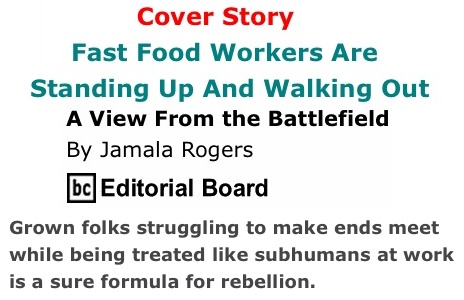


They
are not in a good mood and they certainly aren’t lovin’ it. If workers
in the fast food industry really had it their way, they’d get a livable
wage and better working conditions freaky fast.
The resistance to inhumane work conditions and low pay of the fast food
industry has been bubbling beneath the surface for some time. The first
organized walkout of industry workers happened in New York City last
month. The walkouts inspired workers in Chicago, St. Louis and Detroit
with other cities in the planning stages.
There is still a misperception that teens make up the majority of the
nearly 3.5 million workers in the industry. This is simply not true.
According to the Bureau of Labor Stats, the average age of these
workers is 28 years and for women, it’s 32 years. Women make up two
thirds of the workforce. Grown folks struggling to make ends meet while
being treated like subhumans at work is a sure formula for rebellion.
The stories coming out of the national protests are revealing the ugly
underside of the $200 billion industry and how it treats its employees.
The Fast Food Forward
campaign in New York documented the prevalence of wage theft in the
local industry. The most common theft practices includes having to work
before and after clocking in, working during scheduled meal breaks and
working overtime without getting paid extra for it. These despicable
practices are not unique to the New York area; they are widespread.
Additionally, most workers don’t have paid sick days or health care.
And they have to find their own replacements when they are going to
miss work.
Papa John’s CEO John Schnatter and Jimmy John’s founder Jimmy Liautaud
have already vowed publicly to reduce their workers hours to avoid
paying for health care under the Affordable Health Care Act. These
declarations come at a time when fast food companies are making record
profits and growing exponentially.
The fast food industry has taken a page from the Wal-Mart Employer
Handbook. It pays these workers minimum wage to keep them in poverty
and thereby allows them to be eligible for government assistance to
supplement their paltry salaries.
In St. Louis, the campaign slogan was We Can’t Survive on $7.35.
The hundreds of supporters who joined the protesting workers agree. It
was a powerful image to witness teams of community and faith leaders
escorting workers back to their jobs after their day of absence. The
result was that no workers were hassled upon their return to work and
to date, there’s been no retaliation by management.
Americans addiction to fast food fuels this industry so consumers do
have a dog in this fight. If this movement is to be successful, it’s
going to have to be a community effort and even be supported by those
of us who don’t eat at these restaurants. We must add our voices to the
workers’ demands for dignity in the workplace, a livable wage and the
right to join a union.
BlackCommentator.com Editorial Board member and Columnist, Jamala Rogers, founder and Chair Emeritus of the Organization for Black Struggle in St. Louis. She is an organizer, trainer and speaker. She is the author of The Best of the Way I See It – A Chronicle of Struggle. Click here to contact Ms. Rogers.
 |








